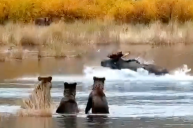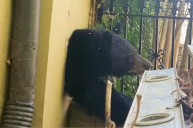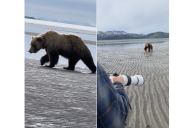After this winter's heavy snow pack, rivers are crashing through canyons with swift currents that put any who enter in danger — including wildlife.
A video shared over the weekend shows a black bear attempting to cross the South Yuba River in Northern California.
The bear wades into the water, soon getting swept up in the powerful river current. He's swept along in the water angling his body toward the shoreline, which seems like it keeps getting further away. Even though we, the viewers, know crossing rivers safely is built into the instincts of wildlife, the bear makes a lot less headway than you expect and keeps getting swept further and further downstream.
At one point, his head appears to dip below the water. In the background, you can hear a man say, "He'll be alright."
Sure enough, the black bear rides the rapids like a pro, coming out on the other side in calmer waters. Eventually, he makes his way up to the shore. Once out of the water, he stares back at the river for a moment. It's like he was thinking, "That was close."
The town of Washington's fire chief, Mike Stewart, shared the video, which was taken Saturday, showing just how fast the water was moving and what could have been a bad ending for the bear.
Stewart points out that a human would not have survived the same situation.
KCRA reported that Northern California rivers are currently flowing at 15,000 cubic feet per second. That astronomical number is hard for the average person to put into perspective, but KCRA's Meteorologist Heather Waldman added some context with her own measurements.
She measured the speed near the shore of the American River at 1.5 mph. While that might not be very fast, water moves at least four to five times as fast in the center. So in water 6 inches deep, you would be hit with around 5 pounds of force, while in 4 feet of water, the rushing river would hit a swimmer with 50 pounds of force.
Snow melt will create these dangerous water currents in California, Nevada, Idaho, Colorado, and many neighboring states for the next few weeks.




